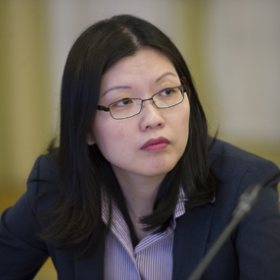
Piin-Fen Kok Weighs in on U.S-China Cyber Relations
Speaking to Politico, EWI’s Piin-Fen Kok weighed in on U.S.-China engagement on cyber issues following the U.S. government’s indictment of Chinese hackers.
EWI’s Piin-Fen Kok was interviewed for Politico’s June 5 story, “China skips Track Two U.S. cybersecurity event,” which reported that Chinese officials had missed an informal cybersecurity meeting hosted by the Center for Strategic and International Studies (CSIS) in Washington last week. Representatives from more than a dozen governments participated, including officials from the U.S. State Department.
A few days later, the U.S. State Department sent a senior official to attend a meeting in Beijing that was sponsored by the Chinese Foreign Ministry and the UN Regional Centre for Peace and Development. Representatives from more than 25 countries were at this event titled “Towards a Peaceful, Secure, Open and Cooperative Cyber Space.” China’s Arms Control and Disarmament Association and the UN Office for Disarmament Affairs also hosted the meeting.
The two meetings occurred after the U.S. accused the country of cyber hacking. Politico reported, “Officials in Beijing have denied the Chinese government engages in economic cyberespionage while simultaneously trying to shift the debate to revelations about the U.S. government’s digital snooping from NSA leaker Edward Snowden.”
Politico asked experts to discuss possible reasons for China’s decision to skip the Washington event. The director of CSIS’s Strategic Technologies Program, James Lewis, explained that there had been a scheduling conflict, which led to China’s absence.
He also remarked that China’s reaction to the hacking indictments will depend on the broader U.S.-China relationship, saying: “They’re probably having fits over the Hagel speech and the Tiananmen commemoration, and don’t know how to respond …They’re not very flexible when it comes to foreign policy and the cyber stuff will depend on the larger context”, referring to a speech made in June 2013 by US Defense Secretary Chuck Hagel, regarding China’s position as an ‘aggressor’ in Asia, and the memorials in honor of the 1989 student protests against the Chinese government in Tiananmen Square.
Kok told Politico that it will be interesting to see whether China uses its status as host of the meeting in Beijing to criticize U.S. actions or whether it will focus on promoting its own views on international cyber cooperation. “China wants to change the public’s notion that it’s a bad guy on cyber issues,” and this upcoming conference will give them a chance to do so.
Three years ago, China co-proposed an “international code of conduct on information security,” which would allow for more government control of the Internet. The U.S. has not shown support for the initiative and continues to support the current system.
At the workshop in Beijing, China’s Vice Foreign Minister Baodong Li “called out ‘a certain country’ for ‘double standards on the cyber issue,’ saying it had ‘concocted ‘regulations’ only applicable to other countries,’ though he did not name the U.S.” Outlining principles to guide Internet governance globally, Li mentioned peace, sovereignty, multilateral governance and universal benefit.
Following the hacking indictments, China suspended its participation in its bilateral cyber working group with the United States. Kok said that multilateral events such as the Beijing conference would allow for U.S. and Chinese officials to continue interacting on cyber issues. “It’s important to keep these channels open,” she said.

